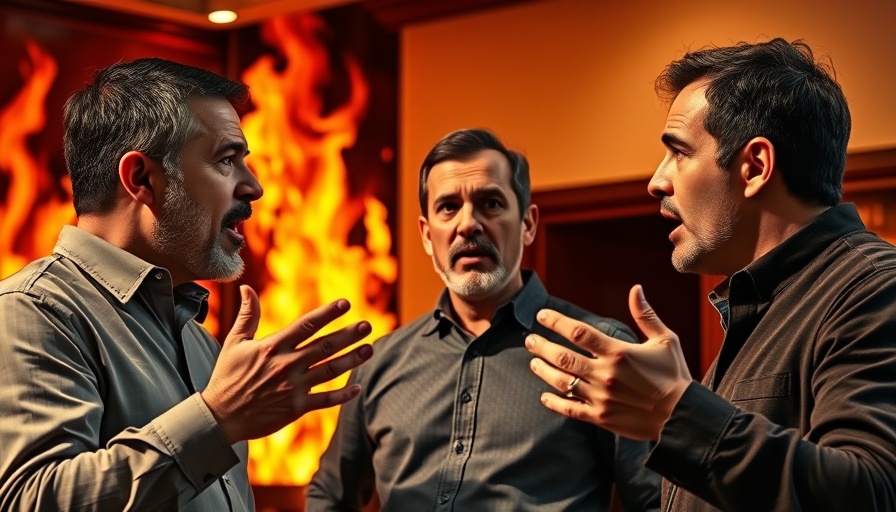
What Wes Huff's Conversation Reveals About Faith
The recent podcast episode featuring Wes Huff on Andrew Schulz's Flagrant has ignited lively discussions about the challenges and nuances of sharing the Christian faith in today's increasingly skeptical culture. As we analyze the key moments and questions raised during this dialogue, it is crucial to recognize that these discussions shine a light on a significant shift in faith conversations: people are genuinely open to considering Christianity.
In HOW Wes Huff Brought Home the GOSPEL To Andrew Schulz, the discussion delves into emotional engagement in faith conversations, prompting us to explore these critical insights further.
The Core Questions on the Table
Throughout the three-hour conversation, several profoundly heartfelt questions emerged, highlighting what non-believers crave most in discussing faith. Wes Huff gracefully navigated these inquiries, suggesting that rather than focusing solely on historical or textual apologetics, we should engage our friends with the emotional gravity that underlies these questions. The six pivotal queries ranged from understanding sin and judgment to the existential fears tied to the afterlife.
Emotional Engagement in Evangelism
Huff demonstrates that in our evangelistic efforts, emotional resonance is crucial. Although skepticism is prevalent, we must recognize that those like Andrew Schultz do not find Christianity inherently stupid, nor do they reject it outright. Instead, they are looking for nuanced responses that resonate on a personal level. For instance, when confronted with the concept of sin, the challenge lies in making these heavy ideas emotionally relatable rather than abstract theological points.
The Potential of Stories to Bridge Understanding
Storytelling emerged as a powerful tool throughout the podcast, with Wes illustrating his points using parables and analogies. In one memorable moment, he drew parallels between reading diverse books and understanding the uniqueness of different world religions. This analogy captivated the room, showcasing how effective storytelling can help convey complex truths in an accessible manner. Just as Wes’s story made the concept of differing worldviews clear, the gospel itself can similarly illuminate the path to understanding God’s nature and love.
Shifting Perspectives on Christianity
Wes's engagement revealed that modern individuals, particularly younger audiences, are more receptive to Christianity than previously thought. They respect those who attempt to share their faith and are curious about the Bible. The willingness of seekers like Andrew to attend church and explore biblical themes is a testament to this cultural shift. Rather than fearing rejection, believers can approach conversations with confidence, knowing that genuine interest often outweighs preconceived notions.
The Need for Authenticity and Open Dialogue
Moreover, as Huff points out, for a productive dialogue, it is essential for Christians to avoid the pitfall of merely defending propositions. People are looking for authentic relationships and genuine discussions. They desire to connect on an emotional level — to grasp how faith integrates into the human experience, and to explore the “how” and “why” behind spiritual concepts.
Future Trends in Faith Conversations
As we move forward into 2025 and beyond, the environment for evangelism appears more favorable than before. No longer should believers shy away from their beliefs or become defensive. Instead, there is an opening to engage in discussions that prioritize emotional sense-making, illustrating how the gospel speaks to the deepest longings and struggles in our lives. This shift in narrative presents an incredible opportunity: if we can express our faith through emotion, story, and heartfelt dialogue, we can truly bridge the gap between skeptics and believers.
Taking Action: Live Out Your Faith Boldly
As believers, it is paramount that we embody our faith authentically, inviting others into our journey with openness and love. The discussion on Flagrant emphasizes that we should not underestimate the power of being genuine in our attempts to share the gospel. Let your conversations be filled with grace and truth, creating an environment where your friends feel free to explore their doubts and questions.
For practical steps on how to deepen your engagement with faith conversations, consider exploring resources such as the 321 Course, which provides tools to navigate faith matters with clarity and conviction. Sharing stories, engaging with passages from the Bible, and attending church with loved ones can profoundly impact your circles.
 Add Row
Add Row  Add
Add 








 Add Row
Add Row  Add
Add 

Write A Comment